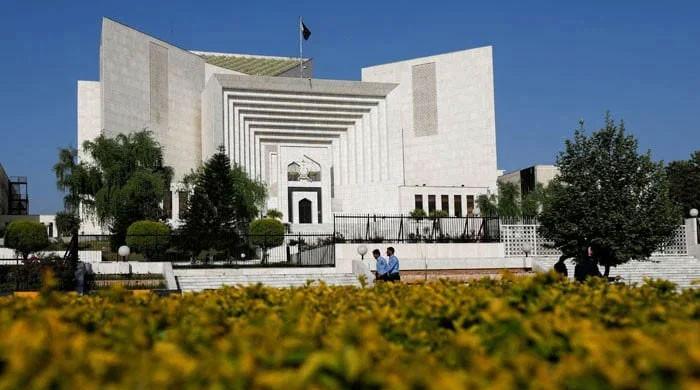- Supreme Court directs AGP Mansoor Usman Awan to address complaints about families not meeting suspects in military custody.
- Seven-member bench presides over hearing on civilians’ trials in military courts linked to May 9 incidents.
- Earlier rulings and objections have led to reshuffling of benches and judicial proceedings.
In Islamabad, the Supreme Court of Pakistan issued directives on Monday, instructing Attorney General for Pakistan (AGP) Mansoor Usman Awan to address concerns raised by families regarding their inability to meet with suspects held in military custody.
The court’s order came during a hearing on intra-court petitions challenging the trials of civilians in military courts related to incidents on May 9 last year. Presided over by a seven-member bench led by Justice Aminuddin, the session included Justices Jamal Mandokhail, Muhammad Ali Mazhar, Hassan Azhar Rizvi, Shahid Waheed, Musarrat Hilali, and Irfan Saadat Khan.
“The families have expressed that they have not been allowed to meet with the prisoners. The attorney general is directed to address these complaints,” stated the Supreme Court’s order.
The hearing was adjourned until July 11, marking the latest development in a series of judicial maneuvers surrounding the case. Previously, objections raised against a six-member bench led to the matter being referred to the Procedure Committee for bench reconstitution.
Petitioner former Chief Justice Jawad S Khawaja’s lawyer, Khawaja Ahmad Hasan, had raised objections concerning the bench composition, advocating for a larger bench in light of certain judicial notes.
In a significant ruling last October, the Supreme Court had declared the trial of civilians in military courts unconstitutional, allowing for criminal trials under civilian law for events stemming from the May 9 riots. However, a subsequent decision suspended this ruling, pending further review.
The May 9-10 events refer to widespread protests following the arrest of Pakistan Tehreek-e-Insaf (PTI) founder Imran Khan on corruption charges. The unrest resulted in attacks on government and military facilities, prompting trials in military courts.
The ongoing legal proceedings underscore the complexities and judicial scrutiny surrounding the trials of civilians in military courts, reflecting broader legal and constitutional debates within Pakistan’s judicial system.





